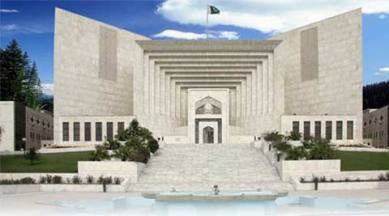Stay updated with the latest - Click here to follow us on Instagram
Pakistan Supreme Court to allow military trials in terror cases
Prime Minister Nawaz Sharif welcomed the decision, which is seen as a major victory for his government, but critics and rights activists say it goes against the constitution and civil rights.

Pakistan’s Supreme Court ruled on Wednesday to allow military trials for terror suspects, the latest in the government’s intensified campaign against terrorism in the wake of last year’s Taliban attack on a school that killed nearly 150 people, almost all of them children.
Prime Minister Nawaz Sharif welcomed the decision, which is seen as a major victory for his government, but critics and rights activists say it goes against the constitution and civil rights.
monthly limit of free stories.
with an Express account.
[related-post]
The ruling gives the green light for army courts to try civilians suspected in terrorism cases, said Zafrullah Khan, the government’s legal adviser. It followed several petitions that challenged a decision by parliament earlier this year to allow military courts to prosecute terror suspects over the next two years.
Khan said the ruling basically upheld the parliament decision. In Pakistan, the parliament has broad rights, including approving amendments to the constitution.
Pakistan has been fighting Islamic militancy for over a decade but authorities took extraordinary measures after the Peshawar school attack, including lifting a moratorium on executions, in place since 2008.
Since the lifting of the moratorium, nearly 200 convicts on death row have been hanged in Pakistan. Militants, too, have been executed among that number, but the majority of them were people convicted of other crimes.
The Pakistani Taliban have been waging war against the state in a bid to overthrow the government and install their own harsh brand of Islamic law, or Sharia. Over a decade of violence, including suicide bombings and armed attacks, has killed tens of thousands of Pakistanis.
When the parliament established the military courts for terror cases, the prevailing argument was that civilian courts are not able to successfully try and convict terrorist suspects since such suspects are able to intimidate witnesses, prosecutors and judges.
In one example, judges would have tea and cookies brought to one of Pakistan’s most feared Islamic militants, Malik Ishaq, during past court proceedings against him. Ishaq was gunned down and killed while being transported in a police van last month.
Also, scores of judges and prosecutors have pulled out of almost 200 cases, including some 70 trials over the killings of minority Shiite Muslims, against Ishaq apparently fearing for their own lives.
The prime minister told lawmakers in parliament he hopes the decision will discourage terror attacks. “Unusual situations warrant unusual measures,” Sharif said.
Constitutional lawyer S.M. Zafar said the decision shows the “civilian government, army and courts are on the same page in the fight against the menace of terrorism.”
But another lawyer, Sheikh Ahsanuddin, criticized the ruling, saying it will undermine the judiciary and civil rights.
“We fear the military courts will override justice,” he said, adding he will file a review appeal against the Supreme Court’s ruling.
It was not immediately unclear when the military trials, which are held in secret, will resume. The trials were suspended pending the petitions to the Supreme court.